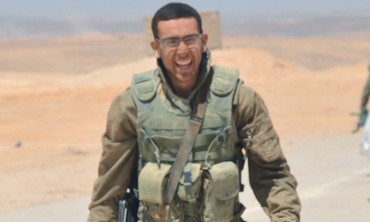Learning Life Lessons As A Combat Officer
Aug 8, 2013

Modern-Orthodox combat training officer Lt. Mikey Soclof. Photo: IDF
Modern-Orthodox combat training officer Lt. Mikey Soclof slumped against the bus seat one Friday afternoon, relishing his first free moment in weeks, as he tried to call two of his friends before Shabbat. “Obviously practicing religion as a soldier is difficult. My free time often comes in contact with what I’m doing in the army,” Soclof said in a recent interview.
Twenty-two-year-old Soclof – who made aliyah from Ann Arbor, Michigan – had just finished training a group of new immigrants in a two-week crash course. As a combat training officer, Soclof recruits soldiers, leads them through boot camp and then assigns them as drivers, gunners or loaders in the Armored Corps. He is responsible for 36 soldiers, five tank commanders and a sergeant.
Being an elite officer has always demanded more than the standard amount of work. Officers are known to work long hours, organize activities and sit through late meetings. They are the first to wake up and the last to go to sleep. It is even harder when you are religiously observant
“Israel is less religious than it is secular. The first time you see that is in the army. All of a sudden instead of your whole community practicing kosher, it’s maybe three or four guys. Usually you can’t even get the 10 people you need for a regular prayer service,” Soclof said. Like many Orthodox soldiers, Soclof strives to reconcile religion with the rigors of protecting the nation.
“If someone needs to go to the hospital, it is okay to drive on Shabbat. In the army, it’s the same thing. Turning on my tank – something that is forbidden on Saturday – is okay to me because it’s for the purpose of defending my country,” Soclof said. “I’ve come to the conclusion that people’s lives are more important than always keeping Shabbat.”
Read the full article here.



